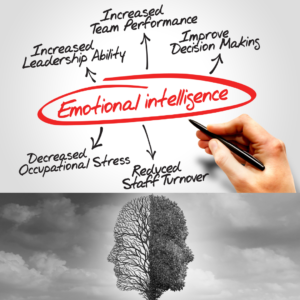
The purpose of this blog is to examine the reasons why Emotional Intelligence (EI) rather than proven technical ability or high intelligence quotient (IQ) should be the primary consideration during employee selection and beyond.
EI refers to the ability to perceive and identify emotions in self and others and to manage one’s affective states to enhance well‐being and the quality of one’s personal and professional relationships. EI has received a substantial amount of attention in the Organizational Behaviour, Human Resources and Management (OBHRM) literature in recent years from those who champion its use along with the psychologist cohort such as Daniel Goleman who believes that EI matters more than IQ. EI also connects with several cutting‐edge areas of psychological science, including the neuroscience of emotion, self‐regulation theory, studies of metacognition and the search for human cognitive abilities beyond “traditional” academic intelligence.
This is a behavioural area of huge interest to me, now as part of the Recruitment Sector, specifically regarding how higher levels of EI directly equate to a more pronounced self-awareness and subsequent auto-correction of personal triggers to enhance job performance, positively influence a team dynamic and cultivate professional working relationships for improved interaction.
The historical view of leaders and individual contributors as separate entities where leaders led and others followed is hugely redundant now, there is an increasing challenge to identify and select individuals with the ability to succeed in the contemporary environment of team-based organisations. EI research has served to highlight the important role of emotions in social relationships and is, in my belief, hugely integral to careful, correct candidate selection, employment satisfaction and continued retention leading to an empowered, influential and ultimately successful working team model.
I am a professional with twenty (20) plus years’ experience, working in the past, in a highly regulated industry and have been part of many teams, some more successful than others. Throughout my working life, I have often queried why these teams were better performing than others, why the dynamics of some just worked and in others where personal agendas negatively affected the team cohesion resulting in dissatisfaction, a complete breakdown of inter and intra-team collaboration ultimately resulting in high levels of attrition. While writing this blog, I have had conversations with some of my peers on their perspectives on EI. Many think that EI matters and indeed matters a lot but more tellingly all believe that EI needs to matter a substantial amount more now and into the future.
 Highly successful teams are those where every cog in the wheel performs in synchronicity. Key to this, in my opinion, are several aspects, the most important and effective being around cultivating EI in all employees. To aid this blog, I initially assessed the value placed on EI during the recruitment process.
Highly successful teams are those where every cog in the wheel performs in synchronicity. Key to this, in my opinion, are several aspects, the most important and effective being around cultivating EI in all employees. To aid this blog, I initially assessed the value placed on EI during the recruitment process.
At the pre- and interview stages, there are several pointed questions asked to ascertain individual character and personal style based on candidate entry level such as
a) people leader, b) team manager and c) individual contributor to assess where the applicant falls within the required EI footprint.
Based on this scorecard, candidates fall into one (1) of two (2) categories: 1) Below Footprint and 2) Within Footprint.
Ultimately the candidate who has the required footprint gets through the door but what does this mean in real terms – how does this go on to improve business impact today and into the future especially in these uncertain times amidst the grapple of a post-pandemic world where remote/hybrid teams are the new norm, integrity is key, a reflection of life direction was a by-product of prolonged lockdowns and employee resignation has hugely increased as a result?
It is paramount, therefore, that organisations challenge their previous assumptions and readily adopt a growth mindset where change is the new buzzword. EI is the future for this “tomorrow’s world” framework. Let me explain why;
People must be able to work effectively in high-stress times and that means being able to manage their anxiety, being able to handle their fears, and being able to stay clear and calm amid turmoil so that their cognitive abilities can function effectively.
To truly harness diversity and create inclusive environments where most organisational members can thrive, a deeper, internal individual understanding and skill set is needed. In that vein, EI is viewed as a means of creating the skills and resulting behaviours needed to create inclusive organisational cultures and environments that truly recognise the benefits and challenges associated with diversity– in other words, getting out of the box.
Equipped with all this knowledge, I was still left pondering, “Is this enough”?
I have concluded that the real key to unlocking the EI conundrum is the individual responsibility each of us has in turning the spotlight directly on ourselves.
Developing skills in emotional intelligence is about peeling away the layers of “that’s just me” to move to a place of knowing ourselves and replacing ineffective behaviours and self-limiting beliefs with empowered ones.

Aisling joins Careerwise with 20+ years of progressive experience in Quality Management Systems, Quality and Training Compliance, Project Management, Continuous Process Improvement, Product Development, New Product Introduction, Supplier Management and Customer Management in a wide range of Pharmaceutical, Bio-Pharmaceutical and Medical Device organisations.
Aisling graduated from the University of Ulster with an Honours Degree in Biochemistry in 2000 while concurrently completing a diploma in Industrial Engineering in 1998. Aisling is currently completing an MBA with MTU and is expected to graduate in Autumn 2023. Aisling is a current member of the MBA Association of Ireland (MBAII).
CareerWise Recruitment. EastGate Village, EastGate, Little Island, Cork.
Phone: +353 (0) 21 206 1900
Email: info@careerwise.ie